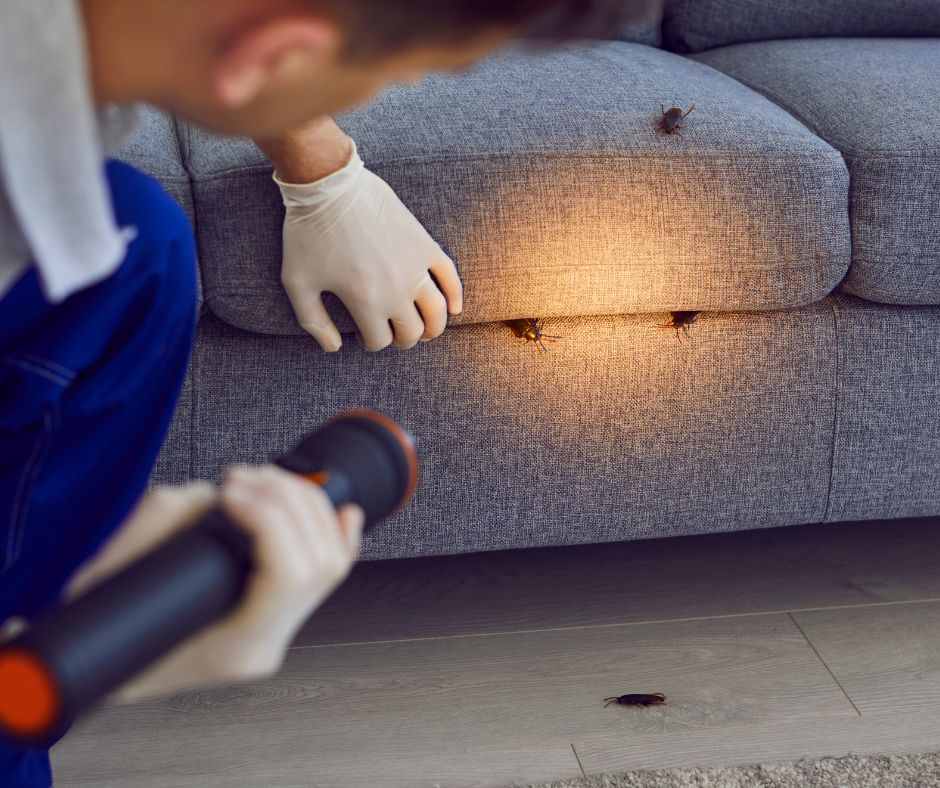Uncover the Importance of Pest Control in Maintaining a Healthy Environment and Therapy Methods

The Function of Pests in Ecological Communities
Insects, often watched exclusively as nuisances, play a complex function in ecosystems that is essential for preserving ecological equilibrium. They contribute considerably to numerous ecological procedures, consisting of pollination, nutrition cycling, and bug control. Several insect varieties, such as and butterflies, are necessary pollinators for a vast array of plants, which in turn sustains biodiversity and food production.
Additionally, insects work as prey for many predators, producing a vital web link in food webs. This connection ensures the survival of different species and aids control populations within communities (Termite treatment Port Charlotte). Furthermore, decomposer parasites, such as particular beetles and fungi, contribute in breaking down raw material, therefore enhancing soil and helping with nutrient recycling.
On the other hand, while pests can be advantageous, their overpopulation or intrusion into non-native environments might interrupt these ecological functions. This complexity highlights the value of understanding insect characteristics, as effective parasite monitoring techniques must take into consideration both their eco-friendly duties and prospective influence on human activities. Stabilizing pest visibility while lessening damage is important for preserving the integrity of ecosystems and making certain farming productivity.
Wellness Dangers Associated With Pests
The visibility of insects in various settings prolongs beyond their ecological roles, as they likewise position significant wellness dangers to pets and people. Numerous pests, consisting of rodents, insects, and bloodsuckers, are service providers of conditions that can have significant health implications. For instance, rats are recognized to send hantavirus and leptospirosis, both of which can lead to severe respiratory and renal concerns, specifically.
Insects such as insects and ticks are infamous for spreading out vector-borne conditions like malaria, dengue high temperature, and Lyme condition. These ailments can result in high morbidity and mortality prices, especially in vulnerable populaces. Additionally, insects like insects and cockroaches can aggravate allergic reactions and asthma, adding to respiratory system issues in people, especially those with pre-existing conditions.
Moreover, the visibility of parasites can lead to emotional tension and pain, influencing general health. Contamination of food and surfaces by insect droppings and continues to be can lead to foodborne health problems, highlighting the relevance of preserving sanitary conditions. Understanding the health dangers associated with insects is essential in identifying the requirement of reliable bug monitoring methods to secure human and animal health.

Advantages of Effective Insect Control
Reliable bug control is vital for keeping a healthy and balanced and secure setting, as it continually mitigates the numerous risks related to pest infestations. One of the primary advantages of reliable pest monitoring is the decrease of wellness threats. Parasites such as rats, mosquitoes, and cockroaches are vectors for illness that can influence both humans and pets. By controlling these populations, the likelihood of illness transmission is considerably decreased.
Furthermore, effective pest control safeguards building and structures from damage. Several bugs, like termites and carpenter ants, can cause comprehensive structural damages that might need costly repairs. By proactively taking care of these homeowners, invasions and organizations can secure their financial investments.
Another considerable benefit is the improvement of overall high quality of life. A pest-free setting adds to mental well-being and lowers stress connected with problems. Additionally, efficient parasite control cultivates a safer atmosphere for pet dogs and children, making sure that homes continue to be havens devoid of disease-causing organisms and hazardous chemicals.
Common Parasite Control Strategies

In the world of insect monitoring, different techniques are used to fight invasions effectively. These methods can be broadly classified into three main techniques: cultural, mechanical, and chemical controls.
Social control involves customizing practices to minimize insect survival, establishment, and recreation. This might consist of crop rotation, correct sanitation, and environment control, which collectively produce an atmosphere less for pest proliferation.
Mechanical control uses physical techniques to remove insects (Termite treatment Port Charlotte). Strategies such as barriers, traps, and vacuum cleaners are generally used to straight eliminate parasites from a location. This strategy is especially effective for managing rodents and bugs without the usage of hazardous chemicals
Chemical control includes the application of pesticides to manage parasites. These materials can be categorized into fungicides, herbicides, and pesticides, each targeting particular kinds of pests. It is important to use these chemicals carefully, adhering to safety and security standards and guidelines to reduce possible harm to non-target species and the atmosphere.
Each bug control technique has its restrictions and advantages, and often, an integrated method incorporating numerous approaches generates the best cause preserving a pest-free atmosphere.
Sustainable Parasite Management Practices
Sustainable parasite management practices include a variety of approaches designed to minimize ecological effect while successfully managing insect populations. These techniques focus on making use of environmentally friendly techniques over chemical pesticides, thus reducing the threat of injury to non-target varieties, consisting of valuable insects, wild animals, and human beings.
Integrated Bug Management (IPM) is a keystone of lasting techniques, integrating organic, cultural, mechanical, and chemical techniques to take care of insects. Organic control involves introducing all-natural predators or parasites to subdue pest populaces. Social practices, such as plant turning and polyculture, disrupt pest life cycles and boost environment strength.
Mechanical methods, such as obstacles or traps, can properly prevent bug access without chemical intervention. In addition, maintaining healthy ecological communities through appropriate soil administration, plant wellness, and biodiversity can naturally mitigate bug issues.
Education read here and understanding are vital elements, empowering individuals and neighborhoods to recognize bug hazards early and implement precautionary actions. Termite treatment Port Charlotte. By fostering an alternative strategy Continue that balances insect control with eco-friendly stability, lasting insect administration methods not just shield structures and crops but likewise add to a healthier environment for future generations
Conclusion

Understanding the health and wellness risks associated with insects is crucial in acknowledging the necessity of efficient insect management strategies to safeguard human and animal health.
Effective parasite control is crucial for preserving a risk-free and healthy and balanced atmosphere, as it constantly alleviates the countless threats linked with go right here pest problems.Integrated Bug Administration (IPM) is a cornerstone of lasting practices, integrating organic, cultural, mechanical, and chemical techniques to take care of insects. By recognizing the role of insects, identifying involved health and wellness threats, and employing varied treatment methods, a lasting method to pest monitoring can be achieved. Integrated Insect Monitoring (IPM) stresses a holistic method that minimizes injury to useful microorganisms while properly managing bug populaces.